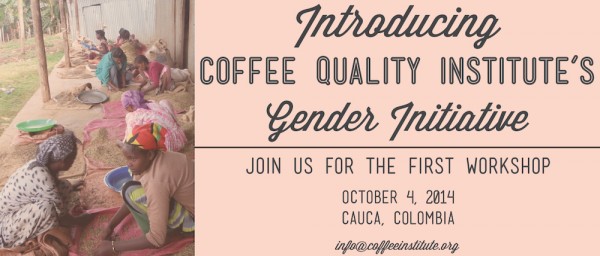The conversation surrounding gender issues in producing countries is changing, and it may be time for some fresh ears.
Consider this: The Bill and Melinda Gates Foundation — one of the largest private foundations in the world with an endowment of $38.3 billion USD as of June 2013 — updated its official policy on issuing grants to agricultural development programs that do not explicitly factor the potential effects on women. It is, in a nutshell, “No.” Here it is in full:
We receive some grant proposals that do not account for gender differences and do not consider how agricultural initiatives may benefit or hinder women or men. We refer to such proposals as gender neutral. The foundation does not support these types of projects because women can be further marginalized if their concerns and needs are not explicitly factored into the program design.
(related: Hidden Influencers: How Root Capital Is Expanding the Lens on Women In Agriculture)
The reasons for the Gates policy are many, but not least is the increasing mass of research, anecdotal evidence and economic analysis suggesting that the role of women on smallholder farms has direct correlations to production and crop quality. And in coffee, the continued marginalization of women in the coffeelands may be just as big a threat to supply sustainability as La Roya, climate change and outside market forces.
This is part of the thinking behind a new gender equity initiative from the Coffee Quality Institute. Not only is the Institute concerned the importance of women in sustainability, it is also — as its name might imply — concerned with quality.
“One of the things we’ll be highlighting through this work is that when women are more integral participants in decision-making at the household level, or at the supply level, there is some real evidence and anecdotal evidence that the quality of the product improves,” Kimberly Easson, vice president of strategic partnerships for CQI, recently told Daily Coffee News. “We’re going to try to show people inside and outside the industry that this makes sense as a business strategy.”
(related: Roaster Matthew Algie to Lead Six-Figure Assistance Program in Eastern Uganda)
CQI actually launched a similar gender-focused program in 2005 called Women In Coffee Leadership, but the project was only funded by USAID for a year, leaving CQI since without a gender program. The new gender equity program, aside from better-positioning CQI for additional funding opportunities, is launching with farmer-focused workshops, beginning in Popayan, Colombia, on Oct. 4-8, followed by multiple-day workshops in Central America, East Africa and Indonesia next year. Importantly, the workshops will attempt to give voice to farmers, women and men alike, as stakeholders within the coffee industry, with the idea of better determining “how we can collectively support gender equity within our supply chains.”
“The point of these workshops is for people to see for themselves that there is an opportunity,” Easson says. “The idea is that we can bring together people from the industry, as well as men and women from these farms. If we have a vision for where we want to go, and we look at how these power relationships impede or contribute to our vision.”
In addition to the workshops, CQI is developing an extensive review of the existing literature and research on women in coffee production — one that will not only help develop a farm-level “best practices” guide, but will also provide the basis for an “academically based, industry-friendly report that offers recommendations for investments, partnerships, and pilot projects,” CQI says.
“We’re going to try to shine the light on some of the existing research,” Easson says. “We’re not just talking about women and men, or about coffee production; we’re talking about healthy communities.”
Nick Brown
Nick Brown is the editor of Daily Coffee News by Roast Magazine.
Comment
1 Comment
Comments are closed.







I am against almost any form of gender profiling in countries other than our own, which focuses much on America but should be stated in any country. For whatever reason, many Americans have a strong desire to tell others how to live, what to do, what to eat, and on. Religion may be the best example. I have been to West African countries, as example, and some are easily the worst places on earth in ways of civilization and daily practices and just plain life. For example in one unnamed, the women performed almost every task and the men almost none. It is absolutely not our mission to tell other countries how to operate in any arena. We don’t know enough of them or how their daily habits arrived nor do we have any business whatsoever dealing in or influencing their affairs. Leave them alone in their internal affairs. Buy the coffee or don’t. Unless you have been there you have no idea of the resentment we cause in our meddling, and it is strong and often the only time you will hear some sort of curse word from any of them. You can easily find something better to focus on in your coffee publication and comments. Interference is a poor choice.